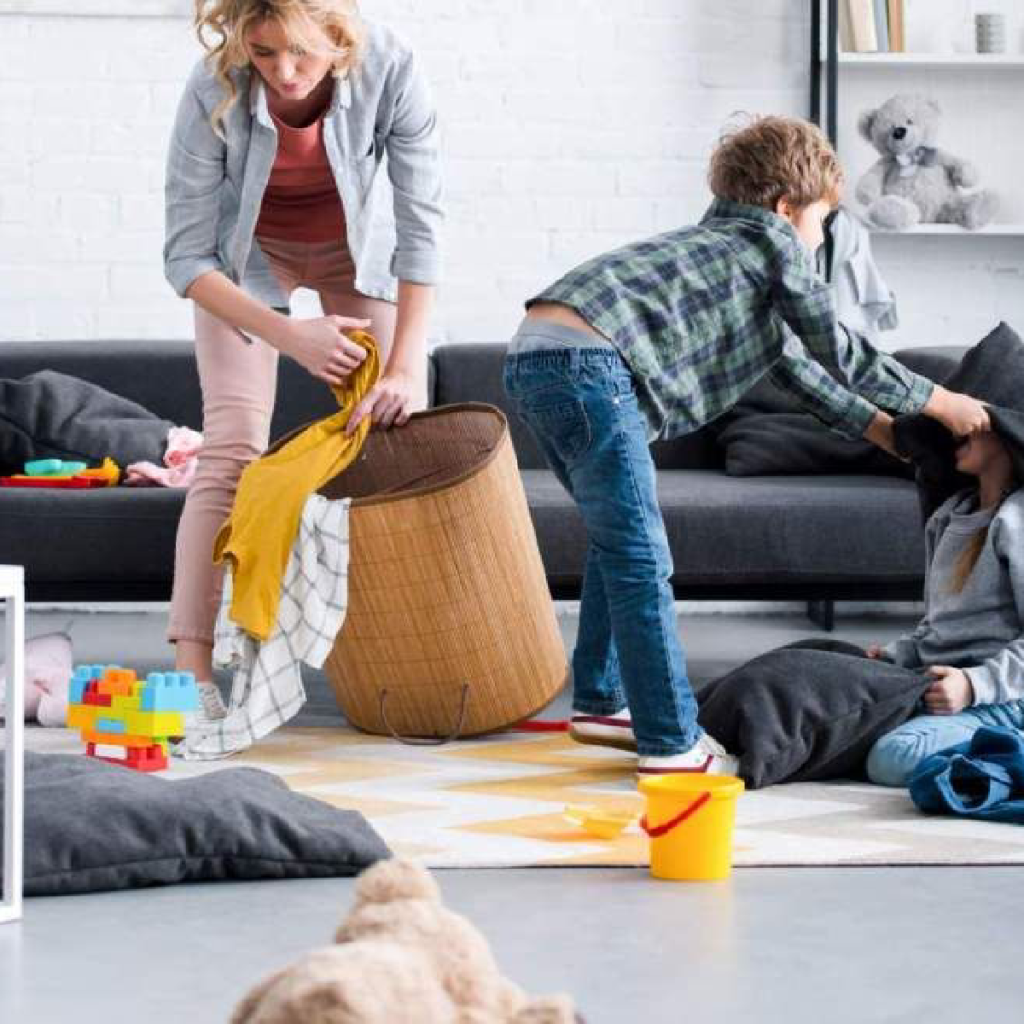Discover effective strategies and tips on how to teach household chores to 7-8 year old children.
How to Teach Household Chores to 7-8 Year Old Children
Are you tired of doing all the household chores yourself? Do you wish your little ones would lend a helping hand? Teaching household chores to 7-8 year old children can be a fun and rewarding experience for both you and your little helpers. In this article, we will explore the importance of chores for children, suitable chores for this age group, teaching techniques, motivating children to do chores, and how to handle any resistance that may arise. So, let’s dive in and transform your little tykes into household chore superheroes!

Understanding the Importance of Chores for Children
Chores are not just about getting things done. They play a crucial role in the development of your child. By assigning age-appropriate tasks, you are helping them acquire essential life skills and building their confidence and independence. Plus, chores teach responsibility and help instill a strong work ethic from an early age.
But what exactly is it about chores that make them so beneficial for children? Let’s dive deeper into the role of chores in child development.
The Role of Chores in Child Development
Chores provide children with opportunities to develop valuable skills, such as problem-solving, time management, and organization. When children are given specific tasks to complete, they learn to break down larger tasks into smaller, more manageable ones. This skill of breaking down tasks can be applied to various aspects of their lives, from school assignments to personal goals.
Furthermore, chores help children develop time management skills. When they have a set list of chores to complete within a given timeframe, they learn to prioritize and manage their time effectively. This skill becomes invaluable as they grow older and face more responsibilities.
Organization is another skill that children can develop through chores. Whether it’s organizing their toys, arranging books on a shelf, or sorting laundry, children learn the importance of keeping things in order. This skill can translate into better organization in their academic and personal lives, leading to reduced stress and increased productivity.
Benefits of Chores for 7-8 Year Olds
For 7-8 year olds, chores can have even more profound benefits. At this age, children are refining their motor skills, hand-eye coordination, and spatial awareness. Engaging in chores that require physical movements, such as sweeping the floor or folding clothes, can help them further develop these skills.
Moreover, involving children in household chores fosters a sense of belonging and contribution to the family unit. When they see that their efforts are valued and appreciated, it boosts their self-esteem and strengthens their bond with the family. This sense of belonging also instills a sense of responsibility and empathy towards others, as they learn to contribute to the well-being of the entire household.
As children complete their chores, they also learn the importance of perseverance and commitment. They understand that tasks need to be completed, even if they are not always enjoyable. This mindset can shape their work ethic, teaching them the value of hard work and dedication.
In conclusion, chores are not just mundane tasks to be completed; they are valuable opportunities for children to learn and grow. By involving children in age-appropriate chores, parents can help them develop essential life skills, boost their self-confidence, and instill a strong work ethic. So, next time you assign a chore to your child, remember the long-term benefits it can bring to their overall development.
Identifying Age-Appropriate Chores
Now that you understand the importance of chores, it’s time to identify which tasks are suitable for your 7-8 year olds.
When it comes to assigning chores to children, it’s important to consider their age and capabilities. At the age of 7-8, children are ready to take on more responsibility and can handle a variety of tasks. By involving them in household chores, you not only lighten your own load but also empower your children to contribute to the functioning of the household.
Suitable Chores for 7-8 Year Olds
At this age, children are capable of performing a range of chores that can help them develop important life skills. Some suitable chores for 7-8 year olds include:
- Making their bed: Teaching them to make their bed every morning instills a sense of discipline and responsibility.
- Organizing their toys: Encouraging them to keep their toys in order helps develop their organizational skills and fosters a sense of tidiness.
- Setting the table: Allowing them to set the table for meals not only teaches them basic table manners but also gives them a sense of pride in contributing to family mealtimes.
- Watering plants: Taking care of plants teaches children about nurturing and responsibility. They can learn about the importance of watering plants and the impact it has on their growth.
- Feeding pets: Involving children in the care of pets helps them understand the importance of responsibility and compassion towards animals.
These chores are age-appropriate and provide children with a sense of accomplishment as they contribute to the household tasks.
Safety Considerations for Children’s Chores
Before letting your little ones dive into their chores, it’s crucial to consider their safety. While assigning chores, make sure to assess the potential risks and take necessary precautions to ensure their well-being.
One important aspect of safety is to ensure that any tools or cleaning products involved in the chores are age-appropriate and stored safely out of reach. This prevents accidental injuries and exposure to harmful substances.
Supervision is also key, especially when children are handling tasks that may pose a higher risk. By supervising them, you can guide them through the process, provide assistance when needed, and ensure that they are following the necessary safety guidelines.
Furthermore, it is important to provide clear instructions on how to handle potentially hazardous tasks. This includes teaching them how to use tools safely, explaining the proper techniques, and emphasizing the importance of caution.
By considering safety measures, you can create a secure environment for your children to engage in chores and develop valuable life skills.
Teaching Techniques for Household Chores
Now that you’ve chosen suitable chores for your 7-8 year olds, it’s time to teach them how to do these tasks effectively.
Teaching children household chores is not just about assigning tasks and expecting them to complete them. It is an opportunity to instill responsibility, independence, and valuable life skills. By teaching them step-by-step instructions and using visual aids, you can make the learning process engaging and enjoyable for your children.
Step-by-Step Instructions for Chores
Break down each chore into manageable steps and explain them to your children. This will help them understand the task at hand and prevent them from feeling overwhelmed. For example, if the chore is to make their bed, you can explain the steps as follows:
- Start by straightening the sheets and blankets.
- Smooth out any wrinkles and tuck the sheets neatly under the mattress.
- Arrange the pillows and fluff them up.
- Make sure everything looks tidy and presentable.
By breaking down the chore into smaller steps, you are setting your children up for success. It allows them to focus on one task at a time and gives them a sense of accomplishment as they complete each step.
Demonstrate the process yourself, and then encourage them to give it a go. Children learn by observing and imitating, so showing them how to do the chore correctly is essential. By modeling the behavior, you are providing them with a visual example to follow.
Be patient and encouraging as they learn the ropes. Remember that children are still developing their motor skills and may not get things right the first time. Offer praise for their efforts and provide constructive feedback to help them improve.
Always emphasize the importance of doing the task to the best of their ability. Teach them that taking pride in their work and doing their best is more important than just completing the chore. This mindset will help them develop a strong work ethic and a sense of responsibility.
Using Visual Aids in Teaching Chores
Kids are visual learners, so why not make use of visual aids to help them understand the chore expectations better? Use colorful charts or checklists to visually represent the tasks and track their progress. This can make the learning process more engaging and fun.
Create a chore chart with pictures or icons representing each task. Hang it in a visible place where your children can easily refer to it. As they complete each chore, they can mark it off the chart, giving them a sense of accomplishment and progress.
Another visual aid you can use is a checklist. Write down the steps for each chore and let your children check them off as they go. This not only helps them stay organized but also gives them a visual representation of their progress.
Visual aids can also be used to introduce a reward system. For example, you can create a sticker chart where your children earn a sticker for each completed chore. Once they reach a certain number of stickers, they can redeem them for a small reward or privilege.
By incorporating visual aids into the teaching process, you are making chores more enjoyable and interactive for your children. They will feel a sense of ownership and accomplishment as they see their progress visually represented.
Motivating Children to Do Chores
Let’s face it, even adults sometimes need a little motivation to tackle household chores. The same goes for children!
The Use of Rewards and Incentives
Consider implementing a reward system to motivate your little ones. Simple rewards, such as stickers or extra playtime, can go a long way in making chores feel like a game. You could also create a chore chart with a points system, and once they achieve a certain number of points, they can earn a special treat or privilege.
Making Chores Fun and Engaging
Turn chore time into a fun activity! Play their favorite music, turn chores into a friendly competition, or create challenges. For example, see who can fold clothes the fastest or who can tidy up their toys in record time. With a little creativity, you can transform mundane tasks into exciting adventures.
Dealing with Resistance to Chores
Despite our best efforts, resistance to chores can sometimes rear its head. Don’t worry – we’ve got you covered!

Addressing Common Objections to Chores
If your child resists doing their chores, take the time to understand their objections. Maybe they feel overwhelmed or think chores are boring. Address their concerns and try to find solutions that work for both of you. This could involve breaking down tasks into smaller parts or finding ways to make chores more enjoyable.
Strategies for Handling Chore-Related Tantrums
Chore-related tantrums can be challenging to handle, but remain calm and consistent. Let your child know that tantrums will not get them out of doing their chores. Speak to them about the importance of contributing to the family and negotiate realistic expectations. Working through these situations together will help teach them resilience and problem-solving skills.
By following these techniques and maintaining a positive and nurturing environment, you can successfully teach household chores to your 7-8 year olds. Remember, patience and consistency are key. Soon enough, you’ll have a team of household chore superheroes on your hands, eager to assist you every step of the way!



